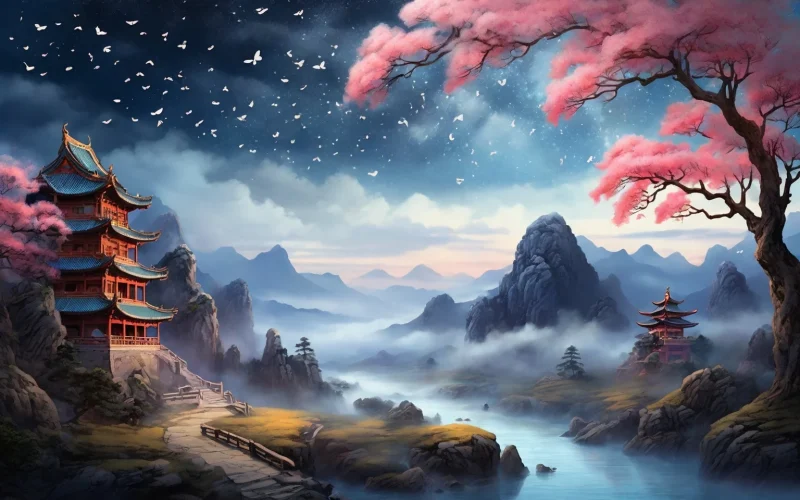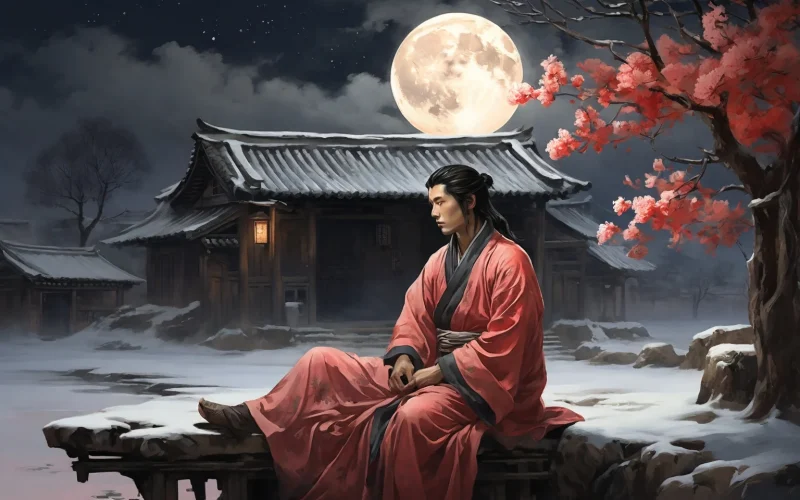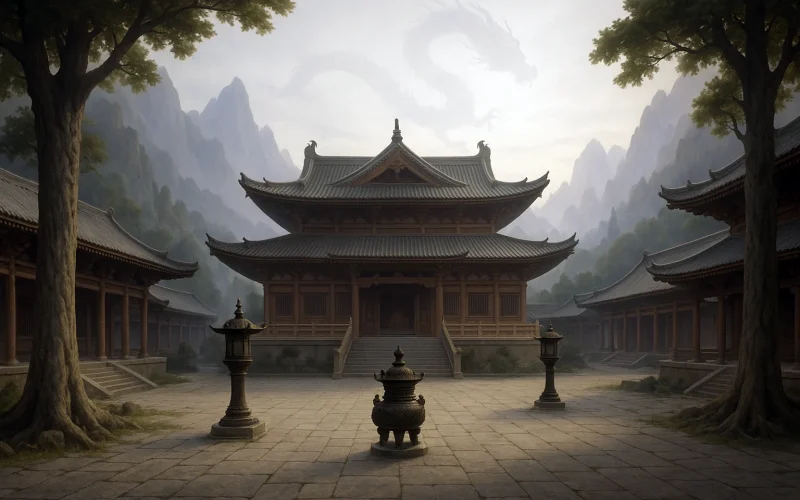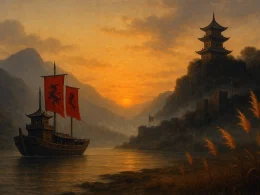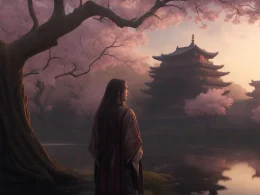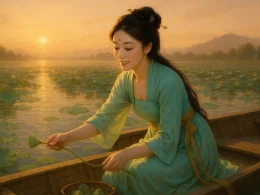The jade metropolis swallows sunset’s spit,
Galaxies dangle like unwashed hair.
My soul divorces ribs to flirt with dream-butterflies,
Dawn’s rooster crows with iron-feathered glare.
Flowers weep glass tears onto granite cheeks,
Pines jerk off streams in icy streaks.
At daybreak I’ll fuck this flesh cocoon,
Saluting entropy’s cartoon.
Original Poem
「宿太平观」
綦毋潜
夕到玉京寝,窅冥云汉低。
魂交仙室蝶,曙听羽人鸡。
滴沥花上露,清泠松下谿。
明当访真隐,挥手入无倪。
Interpretation
This seven-character regulated verse was composed during Qi Wuqian's overnight stay at Taiping Abbey, a Daoist temple nestled in secluded mountains. The poem captures the mystical atmosphere of the sacred site, where the vastness of heaven and earth merges with human contemplation. Through vivid imagery of celestial realms and natural serenity, Qi transitions from worldly clamor to spiritual transcendence, revealing his yearning for reclusive enlightenment.
First Couplet: "夕到玉京寝,窅冥云汉低。"
Xī dào yù jīng qǐn, yǎo míng yún hàn dī.
At dusk, I rest in the Jade Capital’s abode—
the Milky Way hangs low in fathomless dark.
The opening lines establish the temple’s divine aura. "Jade Capital" (玉京), the Daoist celestial palace, elevates Taiping Abbey to a heavenly realm. "Fathomless dark" (窅冥) and "low-hanging Milky Way" (云汉低) create a cosmic atmosphere, blurring the boundary between earth and sky. The poet’s physical arrival parallels a spiritual ascent.
Second Couplet: "魂交仙室蝶,曙听羽人鸡。"
Hún jiāo xiān shì dié, shǔ tīng yǔ rén jī.
My soul meets immortal butterflies in dream,
at dawn, I heed the feathered sage’s cockcrow.
Here, Qi’s consciousness transcends the mundane. "Immortal butterflies" (仙室蝶) nod to Zhuangzi’s dream of transformation, symbolizing liberation from physical form. The "feathered sage’s cockcrow" (羽人鸡)—a rooster from divine realms—marks time in this ethereal space, reinforcing the temple’s detachment from mortal rhythms. Dream and reality intertwine.
Third Couplet: "滴沥花上露,清泠松下溪。"
Dī lì huā shàng lù, qīng líng sōng xià xī.
Dew drips from blossoms, pearls of dawn;
the pine-shaded stream chills clear and bright.
The focus shifts to earthly details, grounding the poem in sensory experience. The onomatopoeic "drip-drop" (滴沥) of dew and the "clear chill" (清泠) of the stream anchor the mystical in the tangible. These pristine natural elements—ephemeral dew, enduring pines—mirror Daoist ideals of harmony and impermanence.
Fourth Couplet: "明当访真隐,挥手入无倪。"
Míng dāng fǎng zhēn yǐn, huī shǒu rù wú ní.
At daybreak, I’ll seek the true recluse,
wave my hand, and step into the boundless.
The closing lines resolve Qi’s journey into action. The "true recluse" (真隐) embodies Daoist sagehood, while "the boundless" (无倪) evokes the infinite Dao. The gesture of waving (挥手) suggests both farewell to the mundane and embrace of the ineffable. Qi’s physical departure becomes a metaphor for spiritual release.
Holistic Appreciation
This poem takes an overnight stay at a Taoist temple as its subject, skillfully blending the real and the ethereal. The opening couplet depicts the magnificent celestial phenomenon of the Milky Way hanging low at night, creating a vast and tranquil atmosphere. The second couplet shifts to the dreamlike realm, where the poet’s spirit interacts with immortals and hears the calls of divine birds, constructing a transcendent poetic vision. The third couplet returns to the reality of the morning scenery in the mountain forest, delicate and serene. The final couplet concludes with a visit to a recluse and an entry into the boundless (wuni), elevating the scene to a spiritual sublimation.
The rhythm of the poem moves from far to near and then back to far again, forming a cyclical flow of imagery. It embodies both the lofty aspirations of transcending worldly concerns and the authentic breath of natural life.
Artistic Features
- Interweaving of Reality and Illusion
Dreams and reality, the celestial realm and the human world are interwoven, unfolding the artistic conception in multiple layers. - Harmony of Movement and Stillness
The stillness of the Milky Way hanging low contrasts with the movement of dewdrops falling and streams flowing. - Taoist Connotations
Taoist allusions such as "Jade Capital" (yujing), "Feathered Immortal" (yuren), and "Boundless" (wuni) evoke a realm beyond the mundane. - Scene and Sentiment Intertwined
The poet’s aspirations are embedded in the scenery, expressing both a longing for the immortal realm and a pursuit of reclusive life.
Insights
This poem demonstrates a life attitude that entrusts one’s existence to nature and spiritual realms. The poet does not merely escape reality but seeks freedom and clarity of mind within the serenity of heaven and earth. It reminds us that beyond the turbulence of worldly affairs, we should preserve a space for the soul to wander and meditate—whether amid mountains and rivers or within dreams—thereby attaining spiritual composure and peace.
About the Poet
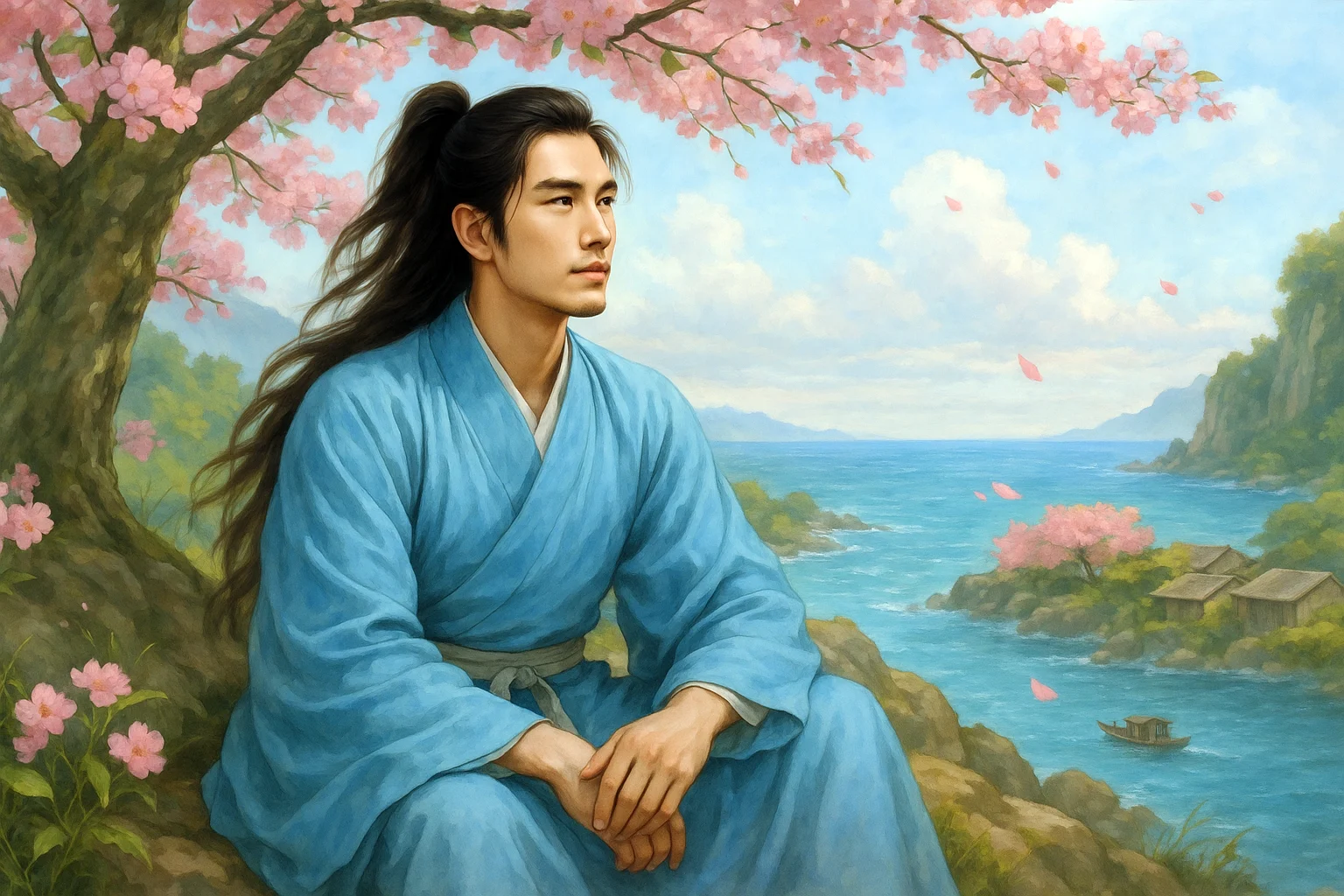
Qiwu Qian (綦毋潜 692–c. 755), a native of Ganzhou (modern-day Ganzhou, Jiangxi), was a representative poet of the Landscape and Pastoral School during the High Tang period. He earned the jinshi degree in 726 (the 14th year of the Kaiyuan era) and held official positions such as Right Reminder (You Shiyi) and Editorial Director (Zhuzuo Lang) before retiring to the Jiangnan region. His poetry, renowned for its depictions of reclusive life and natural landscapes, is characterized by a serene and understated style. He exchanged poetic works with Wang Wei, Meng Haoran, and other literary figures. The Complete Tang Poems (Quan Tangshi) preserves 26 of his poems, which stand out distinctly within the High Tang landscape poetry tradition and significantly influenced the development of later Zen-inspired poetry.






